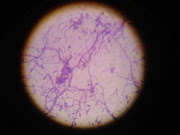Short
Report
on
"The
International Conference on Climate Change Innovation and Resilience for
Sustainable Livelihood"
Photograph
1:
TIRI Scholars attending the international conference
Duration and Time: The
three days international conference was held in Kathmandu on January 12-14,
2015 at Hotel Solatee.
Focus Area: Most
of presentations including both oral and posters are mainly focused on the
climate change and its impact on human and livestocks. Few papers were also
presented on gender analysis and disaster prediction and management. However in
most of the papers, climate change data is primarily focused.
TIRI Participants: TIRI
scholars actively participated in the conference by presenting their works by
both oral and poster presentations.
Experience gained in
the conference: Truly speaking, the conference was
found to be really informative for me and all other TIRI scholars as well.
While interacting in oral and poster presentations with the researchers, I
found something lacking in the researches. They had showed the data regarding
climate change and its impacts to vulnerable people and their livestock. In
many cases, what I observed is they missed to show their research impacts. We
all know that poor people are the most susceptible group of climate change
which is obvious. When there is significant decrease in environmental
temperature, of course people who have no warm clothes will be more affected
but those who are living in ac homes will be less affected. I feel that it will
be better if people also focus on how to minimize the impacts of climate change
on those vulnerable people which will be the really good researches.
Similarly, few works
presented on gender studies as well. I could remember one research in which he
has presented a data of peoples' involvement on farming. He did such researches
previously too. He found that over 80% women involved in farming however men
just spent their time on playing cards. Every year there is only slight changes
in the pattern. If it is the condition then what is the significance of such
studies. What I understood is research
has direct and quick role on development. If our researches are not changing
the thinking of people and benefitting them, then it is not said to be a research.
With time people think differently, but our research should able to change
their thinking very quickly to positive attitude. Our research seems effective
if equal number of men and women are found to be working on farm in our next
visit.
Another thing I felt
lacking in our researches is the technology. Our technologies are still very
classical on climate change study and prediction of possible upcoming disaster.
Due to lack of advanced technologies, people of developing countries are
becoming victims of natural disasters. The only possible solution of minimizing
losses due to climate change is education and technology transfer from
developed country to developing one. It
is a demand of today.
Moreover, the previous
climatic data of Nepal is not found so we couldn't correlate our one year data
with the previous one. Similar problem I found in the presentations of other Nepali
researchers as well.
Conclusion: In
conclusion, the conference was really fruitful. The climate change impacts are
really a big problem. In order to overcome of this problem, all countries in
the world should work together and share their knowledge in such conferences.
Acknowledgement: I would like to thank
all the organizer teams for organizing such an informative conference. And I
specially thank to Colorado State University and Research team (Dr. Diana, Dr.
Katie and Dr. Bowen) for proving such a golden opportunity to gain knowledge on
climate change and its impact.























0 comments:
Post a Comment